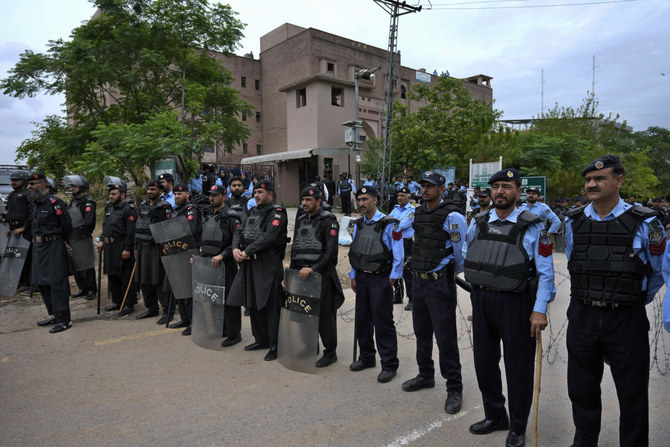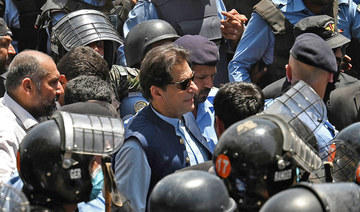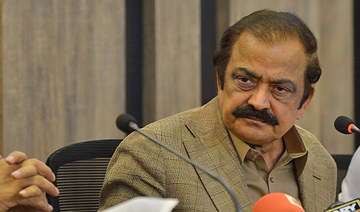ISLAMABAD: Embattled Pakistan opposition leader Imran Khan returned to court on Wednesday, as the nation’s human rights watchdog warned all sides are to blame in a rapidly deteriorating democratic crisis.
Khan’s brief arrest earlier this month sparked days of deadly unrest before Islamabad orchestrated a crackdown on his party, including mass arrests and a pledge to try some protesters in army courts.
The Islamabad High Court and a specialist corruption court granted Khan bail on Wednesday in the same graft case which prompted his arrest on May 9, his lawyers said.
Thousands, including grassroots supporters and key Khan aides, have been rounded up since the Supreme Court declared that detention illegal and allowed him to walk free.
Islamabad says the arrests are justified because it was targeted by anti-state terrorism, while Khan claims his Pakistan Tehreek-e-Insaf (PTI) party is being quashed ahead of elections due by October.
But Hina Jilani, the head of the Human Rights Commission of Pakistan (HRCP), issued a stark warning to “all political stakeholders.”
“Unless they desist from any further measures that could imperil the country’s fragile democracy, they may find themselves unable to steer the country safely through the multiple crises it is facing.”
Since he was ousted from office in a no-confidence vote last spring, Khan has waged an unprecedented campaign of defiance against Pakistan’s powerful military establishment, which analysts say was behind his rise and fall from power.
His arrest was widely seen as payback ordered by top brass after he repeated incendiary allegations that they plotted an assassination attempt against him.
The HRCP said “civilian supremacy has emerged as the greatest casualty” from the deepening political crisis, which comes as Pakistan suffers from a flatlining economy and worsening security situation.
“The government’s inability — or unwillingness — to safeguard civilian supremacy” and PTI’s “incessant humiliation of law... has led to making military interference in politics inevitable,” Jilani said.
Meanwhile on Wednesday, Human Rights Watch criticized Islamabad for agreeing to try 33 civilians in military courts for allegedly attacking army installations during the unrest.
“Pakistan’s military courts, which use secret procedures that deny due process rights, should not be used to prosecute civilians,” said associate Asia director Patricia Gossman.
As the clampdown on PTI continues, several senior figures have defected, leaving former cricket star Khan increasingly isolated.
He says arrests are being used to force resignations. Nonetheless he remains far and away Pakistan’s most popular politician.
Pakistan ex-PM Khan in court as rights watchdog issues warning
Short Url
https://arab.news/zvwk2
Pakistan ex-PM Khan in court as rights watchdog issues warning

- The Islamabad High Court and a specialist corruption court granted Khan bail on Wednesday in the same graft case
- Thousands have been rounded up since the Supreme Court declared that detention illegal and allowed him to walk free













